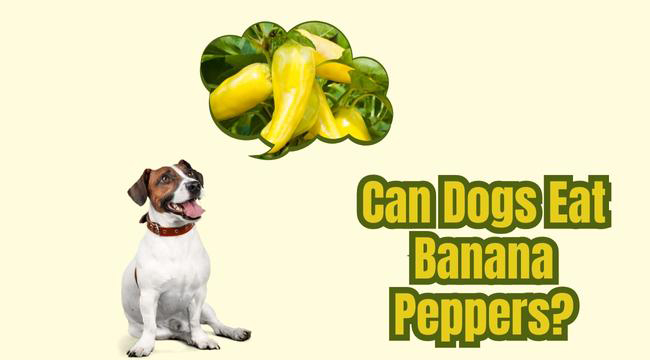Is your heart racing because your dog ate banana pepper that fell off your sandwich? Don’t panic! As a pet parent it’s natural to worry when our furry friends munch on something they shouldn’t. Let’s dive into everything you need to know about dogs and banana peppers, and what to do if your pup decides to make these spicy treats their snack.
The Quick Answer
If your dog ate banana pepper, in most cases, they’ll be fine. Banana peppers aren’t toxic to dogs, but they might cause some temporary discomfort. However, the situation requires different attention levels depending on the amount consumed and whether it was fresh, pickled, or processed.
Understanding Banana Peppers
Banana peppers are mild varieties of chili peppers that get their name from their yellow color and curved shape While they’re perfectly safe for human consumption, dogs have different digestive systems that might not handle these peppers as well as we do
What Happens When Your Dog Ate Banana Pepper?
When your dog ate banana pepper several things might occur
-
Mild Stomach Upset
- Temporary digestive discomfort
- Slight diarrhea
- Minor gas issues
-
Mouth Irritation
- Drooling
- Pawing at mouth
- Drinking more water than usual
-
Potential Dehydration
- Especially with pickled varieties
- Increased thirst
- Changes in urination patterns
The Risks of Different Types of Banana Peppers
Fresh Banana Peppers
- Generally safer
- Lower sodium content
- Minimal processing chemicals
Pickled Banana Peppers
- Higher sodium content
- Preservatives present
- Vinegar might upset stomach
Processed/Cooked Banana Peppers
- May contain harmful seasonings
- Often mixed with toxic ingredients
- Higher risk of digestive issues
When to Contact Your Vet
While banana peppers aren’t typically dangerous, certain situations warrant veterinary attention. For more detailed information about dog health concerns, check out Pet like boss‘s comprehensive guides about dog health and safety.
Contact your vet if you notice:- Severe vomiting- Persistent diarrhea- Signs of dehydration- Unusual lethargy- Loss of appetite- Excessive drooling
Prevention Tips
-
Secure Food Storage
- Keep peppers in sealed containers
- Store food items out of reach
- Use pet-proof garbage bins
-
Train Your Dog
- Teach “leave it” command
- Establish good eating habits
- Reward proper behavior
-
Create Safe Spaces
- Designate pet-free eating areas
- Use baby gates when necessary
- Monitor outdoor activities
Safe Alternatives to Banana Peppers
Instead of letting your dog eat banana peppers, try these healthy alternatives:
- Fresh carrots
- Green beans
- Sweet potato chunks
- Apple slices (no seeds)
- Cucumber pieces
What To Do Right Now
If your dog ate banana pepper recently:
-
Stay Calm
- Panic won’t help the situation
- Observe your dog’s behavior
- Note the amount consumed
-
Provide Water
- Keep fresh water available
- Monitor drinking habits
- Watch for excessive thirst
-
Monitor Symptoms
- Watch for digestive issues
- Check for unusual behavior
- Document any concerns
Long-term Considerations
While one incident of your dog eating banana pepper might not cause lasting harm, it’s essential to:
-
Adjust Your Habits
- Be more careful with food storage
- Clean up food scraps promptly
- Supervise meal times
-
Create Prevention Strategies
- Use deterrent sprays
- Improve training
- Secure garbage areas
-
Learn From Experience
- Identify risk factors
- Update safety measures
- Share knowledge with other pet owners
Common Myths About Dogs and Peppers
Let’s bust some common misconceptions:
Myth 1: All peppers are toxic to dogsTruth: Many peppers are safe in moderation
Myth 2: Spicy food builds tolerance in dogsTruth: Dogs don’t need spicy foods in their diet
Myth 3: Dogs can’t taste spicy flavorsTruth: Dogs can experience heat from peppers
The Bottom Line
If your dog ate banana pepper, there’s usually no need for immediate panic. While it’s not ideal for dogs to eat these peppers, most will experience only mild discomfort if any at all. However, it’s crucial to monitor your pet and contact your vet if you notice concerning symptoms.
Remember to:- Watch for unusual symptoms- Provide plenty of fresh water- Contact your vet if concerned- Take preventive measures for the future
By staying informed and prepared, you can better handle situations where your curious pup decides to sample human foods. For more detailed information about pet care and safety, visit Pet like boss for comprehensive guides and expert advice.
Final Thoughts
While we can’t always prevent our dogs from eating things they shouldn’t, we can be prepared for when it happens. Keep this guide handy, and remember that most cases of dogs eating banana peppers resolve themselves without intervention. However, always trust your instincts – if something seems wrong, don’t hesitate to contact your veterinarian.
Stay vigilant, keep your peppers stored safely, and focus on providing your dog with appropriate treats and foods designed for their dietary needs. After all, a happy dog is a healthy dog!












